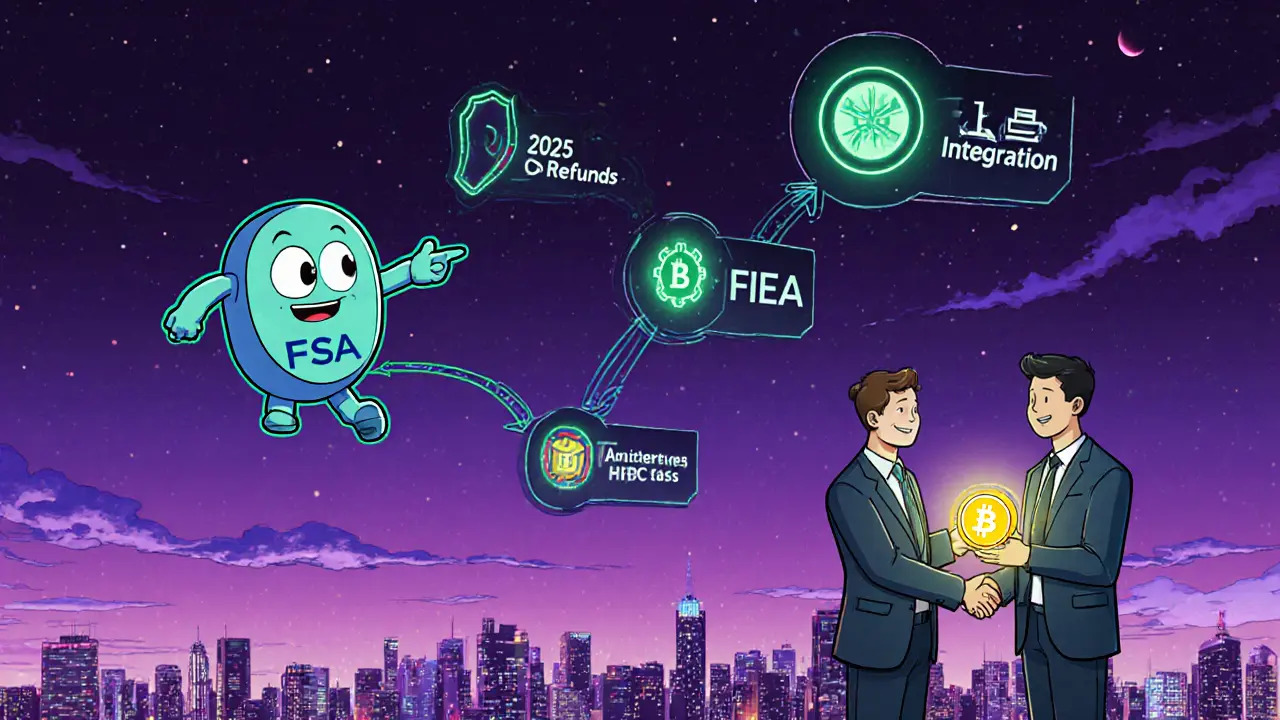Japan has become one of the toughest places for crypto users when it comes to consumer protection. The country’s framework blends strict licensing, fund segregation rules, and fast‑track refund mechanisms that aim to keep retail investors safe even when an exchange collapses.
Crypto consumer protection in Japan refers to the set of laws, regulations and supervisory actions designed to safeguard retail investors and users of cryptocurrency services within Japan is anchored by two main statutes: the Payment Services Act (PSA) and the Financial Instruments and Exchange Act (FIEA). Both are enforced by the Financial Services Agency (FSA), Japan’s single financial regulator.
crypto consumer protection JapanRegulatory landscape at a glance
Since the first PSA revision in 2017, Japan has iterated its rules three more times - 2020, 2023 and a sweeping 2025 amendment. The 2025 update is the one that most directly affects everyday users. Today there are over 12 million registered exchange accounts holding more than ¥5 trillion (about $33.7 billion) in crypto assets. The sheer scale makes robust safeguards non‑negotiable.
What every crypto‑asset exchange must do
To operate legally, a crypto‑asset exchange service provider (CAESP) must:
- Register with the FSA and keep the registration current.
- Maintain a clear split between customer deposits and the company’s own funds.
- Store at least 95 % of user assets in offline cold wallets, reducing exposure to hacks.
- Run a physical office inside Japan - no offshore “virtual” exchanges are allowed.
- Implement full Anti‑Money Laundering (AML) and Know Your Customer (KYC) procedures that verify user identities.
- Hold enough capital reserves to survive market shocks; the exact figure varies by business size but the rule of thumb is ¥300 million for midsize exchanges.
These requirements create a safety net. If an exchange files for bankruptcy, the segregated accounts and cold‑wallet holdings mean users’ crypto should stay untouched.
2025 amendment: faster refunds and direct recovery
Before 2025, a failed exchange that used a bank guarantee or a trust company to safeguard user assets forced investors to wait up to 170 days for a government‑run refund. The new PSA amendment flips that script.
Key changes:
| Aspect | Before 2025 | After 2025 |
|---|---|---|
| Refund initiator | Government ministry | Bank or trust company directly |
| Typical processing time | ~170 days | Within 30 days, often faster |
| User paperwork | Lengthy claims form | Standard bank transfer claim |
| Legal hurdle | Court order needed | Administrative order only |
The shift means that if a registered CAESP collapses, the bank holding the escrow can return the funds directly, cutting red tape and giving users money (or crypto) back in a matter of weeks rather than months.

Enforcement powers and penalties
The FSA can issue orders that force an exchange to keep assets within Japan, freeze accounts, or even shut down operations. Non‑compliance carries heavy costs:
- Unregistered operators face up to three years’ imprisonment and a fine of ¥3 million (now “confinement punishment” after June 2025).
- Registered exchanges that breach segregation rules can be fined up to ¥1 billion and lose their license.
- Repeated AML/KYC failures trigger extra supervisory inspections and possible revocation of the registration.
How digital assets are classified
Not every token gets the same level of protection. The PSA explicitly excludes “currency‑denominated assets” such as prepaid e‑money cards and bank‑issued digital yen. Those fall under separate payment‑instrument rules.
Tokens that behave like securities - offering dividends, voting rights, or promises of profit - are being re‑classified under the FIEA as of June 2025. This brings them under the same disclosure, insider‑trading, and market‑conduct rules that apply to stocks and bonds.
Special cases: crypto credit cards and DeFi
When an exchange issues a credit‑card‑style product that lets users pay in crypto and settle later, it is considered “credit purchase intermediation” under the Installment Sales Act. That pushes the provider into a separate registration track, adding consumer‑information duties such as clear APR disclosure and easy cancellation options.
On the decentralized side, the FSA’s DeFi Study Group meets every two to three months with industry and academic experts. The group’s mandate is to map emerging risks and propose light‑touch rules that still protect users of smart‑contract platforms.

Future outlook: the 2026 FIEA integration
Legislation slated for early 2026 will merge many PSA provisions into the FIEA, creating a single, streamlined code for all crypto‑related financial services. Expected highlights include:
- Mandatory prospectus for token issuers with clear risk warnings.
- Emergency injunction powers that allow the FSA to freeze a malicious DeFi protocol within 48 hours.
- Standardized reporting templates for crypto‑ETF managers, making spot‑Bitcoin products easier for retail investors to access.
These moves signal that Japan will keep tightening the safety net while still encouraging innovation.
Quick checklist for crypto users in Japan
- Verify that the exchange is registered with the FSA - you can check the public list on the agency’s website.
- Confirm that at least 95 % of your holdings are stored in cold wallets; most reputable exchanges disclose this in their transparency reports.
- Make sure the platform offers a clear refund path in case of insolvency - look for language about “direct bank refunds” after the 2025 amendment.
- If you use a crypto‑linked credit card, read the Installment Sales Act disclosures, especially APR and repayment schedule.
- Stay updated on the upcoming 2026 FIEA integration - it may affect token‑type investments you hold.
Bottom line for everyday investors
Japan’s crypto rules are not just a bureaucratic maze; they are a set of practical safeguards that keep your money out of the hands of fraudsters and failed businesses. By choosing a registered exchange, checking cold‑wallet ratios, and understanding the new refund process, you can take full advantage of Japan’s vibrant market without fearing the worst.
Do I need a Japanese bank account to use a registered crypto exchange?
No. Most Japanese exchanges accept foreign bank transfers, but they will still require you to complete the local KYC process, which includes a Japanese residential address.
What happens to my crypto if an exchange goes bankrupt?
If the exchange follows the PSA rules, your assets should be segregated and kept in cold wallets. The 2025 amendment also enables the bank holding the escrow to return your funds directly, often within a month.
Are stablecoins covered by the same consumer‑protection rules?
Stablecoins issued by Japanese entities are treated as crypto‑assets and must meet the same segregation and disclosure standards. Foreign‑issued stablecoins may fall under different payment‑instrument regulations.
Can DeFi platforms operate without FSA approval?
Purely decentralized protocols that have no identifiable operator are currently outside the PSA scope, but the FSA’s DeFi Study Group is actively drafting guidelines that could impose indirect obligations on users and token issuers.
How do I check an exchange’s cold‑wallet ratio?
Many exchanges publish quarterly transparency reports. Look for the “cold‑wallet holdings” percentage; reputable firms usually quote 95 % or higher.


Tom Grimes
October 23, 2025 AT 08:22Wow, reading about Japan's crypto rules just hits different. I feel like the regulators actually care about us everyday folks, not just the big guys. The cold‑wallet requirement sounds solid, but I wonder how many exchanges really meet the 95 % threshold. The fast‑track refund thing could save people a lot of stress if something goes south. Still, the whole licensing maze feels a bit overwhelming for newcomers. Overall, it’s a step in the right direction, I think.
del allen
October 24, 2025 AT 13:23Hey there! This article is super helpful 😊 I jus wanted to say that the 95% cold‑wallet rule is kinda reassuring lol. But omg the paperwork for refunds used to be a nightmare 😅. Good to see banks stepping in now! Thanks for sharing!
Jon Miller
October 25, 2025 AT 18:33Can you believe it? Japan is basically the superhero of crypto protection! 🎉 Their new rules are like a safety net thrown over us newbies. I’m thrilled just reading about the 30‑day refund promise – it’s like magic! If only every country was this on point. 🙌
Rebecca Kurz
October 26, 2025 AT 22:43Hold up!!! Why are they pushing bank refunds now?? Is there some hidden agenda? Maybe the FSA is colluding with big banks to control the flow of crypto!!! We should stay vigilant!!!
Nikhil Chakravarthi Darapu
October 28, 2025 AT 03:53Japan’s approach sets a global benchmark. The strict segregation and cold‑wallet policies demonstrate disciplined governance. Other nations should emulate this model to protect their citizens. It is a source of national pride that Japan leads in crypto regulation.
Tiffany Amspacher
October 29, 2025 AT 09:03Oh, the grandeur of these regulations! They echo the ancient balance between order and chaos, now transposed onto digital gold. When an exchange falls, the cold‑wallet sparks like a phoenix rising from ash, protecting the innocent. Such harmony is rare in our modern frenzy.
Stephen Rees
October 30, 2025 AT 14:13One might say the law mirrors our collective trust, yet unseen forces whisper behind each clause. The subtle power dynamics are intriguing, but the public benefits remain clear.
Katheline Coleman
October 31, 2025 AT 19:23Thank you for this comprehensive overview. May I inquire whether the current capital reserve requirement of ¥300 million for midsize exchanges has been adjusted in light of recent market volatility? Additionally, could you provide guidance on how users may independently verify the cold‑wallet ratios reported by exchanges?
Amy Kember
October 31, 2025 AT 20:46The reports are usually in the quarterly transparency docs; check the exchange’s website for the specific percentage.
Evan Holmes
November 2, 2025 AT 01:56Meh.
Anna Kammerer
November 3, 2025 AT 07:06Honestly, if you’re still unsure, just look at the exchange’s registration number on the FSA list – it’s not rocket science. The cold‑wallet metric is usually a bold claim, so verify it against third‑party audits, unless you like living on the edge. And remember, the 30‑day refund promise only works if the exchange followed the PSA rules, so don’t assume all crypto platforms are created equal. 😉
Mike GLENN
November 4, 2025 AT 12:16Navigating the labyrinth of Japan’s crypto consumer protection can feel like embarking on an epic quest, but the rewards are worth the effort. First, the mandatory registration with the Financial Services Agency creates a transparent registry that any investor can consult, which already filters out many shady operators. Second, the segregation rule forces exchanges to keep user deposits separate from their own funds, essentially building a digital fire‑wall around your assets. Third, the requirement that at least ninety‑five percent of holdings sit in offline cold wallets dramatically reduces the risk of large‑scale hacks that have plagued other jurisdictions. Fourth, the capital reserve stipulation of roughly three hundred million yen for midsize platforms ensures that a sudden market plunge does not instantly wipe out operational liquidity. Fifth, the new 2025 amendment reshapes the refund process: instead of waiting up to 170 days for a governmental order, a bank or trust can now initiate a direct transfer within thirty days, cutting red tape and giving users timely relief. Sixth, the FSA’s enforcement powers, including account freezes and shutdown orders, act as a deterrent against non‑compliance, reinforcing the overall safety net. Seventh, the classification of tokens under the Financial Instruments and Exchange Act aligns crypto‑assets with traditional securities regulations, providing an extra layer of disclosure and investor protection. Eighth, special products like crypto‑linked credit cards are subject to the Installment Sales Act, which mandates clear APR disclosures and easy cancellation options, so consumers are not blindsided by hidden costs. Ninth, the ongoing DeFi Study Group signals that even decentralized protocols will eventually face light‑touch oversight, offering a future path toward safer decentralized finance. Tenth, the upcoming 2026 integration of PSA provisions into the FIEA promises a streamlined legal framework, reducing bureaucratic friction for both regulators and firms. Eleventh, the public availability of cold‑wallet ratios in transparency reports empowers investors to make data‑driven choices about where to store their crypto. Twelfth, the robust KYC and AML procedures, while sometimes inconvenient, protect the ecosystem from illicit activity. Thirteenth, the legal consequences – up to a billion yen in fines or imprisonment – act as a strong incentive for compliance. Fourteenth, the consumer‑focused FAQ sections on exchange websites often detail the exact steps to claim refunds, making the process user‑friendly. Finally, by staying informed and selecting only registered, transparent exchanges, everyday investors can enjoy the vibrant Japanese crypto market with substantially reduced risk.
BRIAN NDUNG'U
November 4, 2025 AT 13:40Your thorough exposition underscores the importance of informed participation; indeed, the layered safeguards present a compelling case for diligent asset management.
Donnie Bolena
November 5, 2025 AT 21:36Wow! This really shows that with the right regulations, crypto can thrive safely!!! Keep an eye on these developments – they’re shaping a brighter future!!!
Elizabeth Chatwood
November 7, 2025 AT 02:46Totally agree its good we got these rules it makes me feel safer investing
Paul Barnes
November 8, 2025 AT 07:56All that hype aside, regulations can also stifle innovation; sometimes less is more.
John Lee
November 9, 2025 AT 13:06Hey, I love the vibe here – the blend of safety and freedom feels like painting with every color in the crypto rainbow!
Jireh Edemeka
November 10, 2025 AT 18:16Oh sure, because a 30‑day refund window will magically solve every nightmare scenario, right? Good luck with that.
Lindsey Bird
November 10, 2025 AT 19:40Oh, the tragedy of over‑regulation! It feels like the spirit of crypto is being shackled by endless paperwork and bureaucracy!
Isabelle Filion
November 12, 2025 AT 03:36One must commend the meticulous elaboration, yet it borders on the prolixic, resembling an academic treatise rather than a pragmatic guide for the lay investor.
PRIYA KUMARI
November 13, 2025 AT 08:46Honestly this whole framework is a political stunt – it only protects big players while pretending to care about the little guy.
Jessica Pence
November 14, 2025 AT 13:56Just double‑check the FSA’s official list for the most up‑to‑date registration info – it’s the fastest way to confirm an exchange’s legit status.